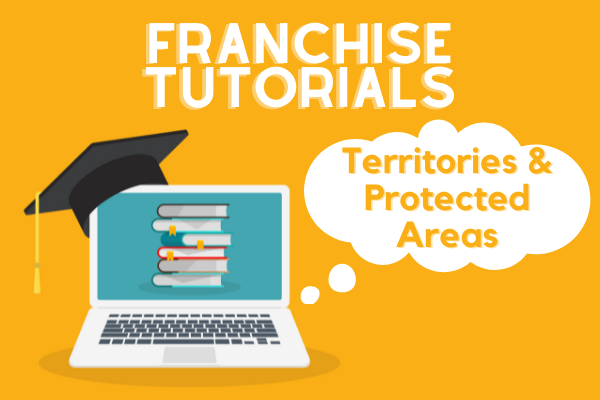To have exclusive property or not? It’s a question on many prospective franchisees’ minds. Why? Because there are pros and cons to both!
Protected areas may be defined by distance, radius, postal codes, municipalities or cities. The territorial boundaries are defined in the franchise agreement and will often state that no other franchise or corporate location under the same brand will be opened within the territory, provided that your franchise licence is in good standing and you are living up to all terms of the franchise agreement.
Let’s look at the pros and cons for franchisors that include exclusive territory or protected areas in the franchise agreement:
Pro:
- Protects your business from other businesses offering the same products within your area. This means if your business is sales and marketing driven, an exclusive territory would provide you with the benefit of not having to compete with other franchisees in the same area.
Con:
- Growth can become limited to the growth and the size of your area. In other words, your business may not be able to take advantage of an increase in population and open two franchise locations within the area as a result.
For franchisors that have non-exclusive territory:
Pro:
- Easily grow the brand. If there is a change in demographics, such as an increase in population, the brand could open multiple locations in close proximity to meet the growing demand. This means that if sale quotas are not being met, a franchisor could license other franchisees within the same area to boost sales.
(Note: If your franchise location was in the area first, the franchisor might provide you the first opportunity to open the franchised location. This is called The Right of First Refusal. If you don’t want to open a second location, the franchisor has the right to offer it to another franchisee.)
Con:
- Could mean competition with a franchisee or with a business that provides similar services. If you have window-washing business operating out of a vehicle, for example, this could negatively impact your growth if a similar business is in the same area.
Franchise Agreement and Territory Rights
The franchise agreement may have other restrictions, restraints or permissions that further define and clarify your territory rights, including:
- Restriction of sales regarding national or institutional accounts.
- Prohibition solicitation of sales
- Reservation of the franchisor’s right to franchise different brands within the territory, which may or may not be a direct competitor to you.
- Restriction and restraint of Internet or mail sales
As a complex issue, it requires careful reading of all terms and conditions so that you have a full understanding of exactly how protected your territory is. Have a lawyer who is familiar with franchising assist you in understanding your franchise agreement and talk to existing franchisees to learn how territory issues have been dealt with by the franchisor in the past.
——————————————————————————–
Disclaimer
The opinions or viewpoints expressed herein do not necessarily reflect those of the Canadian Franchise Association (CFA). Where materials and content were prepared by persons and/or entities other than the CFA, the said other persons and/or entities are solely responsible for their content. The information provided herein is intended only as general information that may or may not reflect the most current developments. The mention of particular companies or individuals does not represent an endorsement by the CFA. Information on legal matters should not be construed as legal advice. Although professionals may prepare these materials or be quoted in them, this information should not be used as a substitute for professional services. If legal or other professional advice is required, the services of a professional should be sought.

